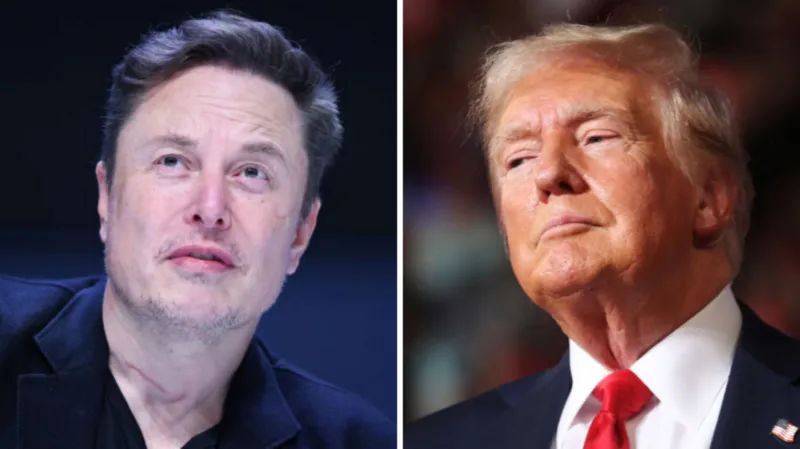Elon Musk’s interview of Republican presidential candidate Donald Trump was marred by technical issues that the tech billionaire blamed on a cyber attack.
The lengthy conversation, which Mr Musk said was aimed at “open-minded independent voters”, began more than 40 minutes late as many users struggled to gain access.
Mr Musk, who owns X, formerly Twitter, said a distributed denial of services (DDoS) attack “saturated all of our data lines”.
Near the end of the two-hour conversation, he doubled down on his endorsement of Trump and called on moderate voters to back the Republican’s campaign.
“Here’s to an exciting, inspiring future that people can look forward to and be optimistic and excited about what happens next,” Mr Musk said.
The conversation got off to a less auspicious start.
More than 20 minutes into when the conversation was actually due to begin, as many users struggled to access the livestream, Mr Musk blamed “a massive DDoS attack on X” for the problems in a post.
Distributed denial of services attacks – or DDoS attacks – are attempts to overload a website to make it hard to use or inaccessible.
Once the conversation between the two men began, Mr Musk said the alleged cyber attack showed there is opposition in the US to hearing what Trump had to say.
It is not clear what caused the technical problems with the X audio conversation or who may have been behind any alleged attack.
“A DDoS attack sends a very large number of signals to an online target to disrupt it,” Anthony Lim, Director of the Centre for Strategic Cyberspace and International Studies in Singapore, told the BBC.
“It is unlikely it would affect only one single service or feature on a website.”
Mr Lim added that it is possible that a large number of people trying to listen could have temporarily crashed the service.
However, Andrew Hay from IT firm Damovo said the problems could have been caused by a cyberattack: “I believe the DDoS attack was targeting the broadcast portion of X’s service, without significantly impacting core functionality for everyone else on the website.”
“Conducting a large-scale DDoS attack is relatively easy, needing either a large number of compromised systems or an identified technological flaw in the target to exhaust it’s resources,” he added.
Mr Musk said in a subsequent post that the system was tested with “8 million concurrent listeners” before his live chat.
During the conversation, X Spaces showed about one million people listening in
The glitchy beginning was reminiscent of Florida Governor Ron DeSantis’ entry into the White House race in May 2023, which was held on X and saw the livestream malfunction.
The conversation on X comes as Trump, the former president and Republican presidential nominee, is trying to reset his re-election campaign.
Opinion polls suggest that the Democratic nomination of Ms Harris has tightened the close race for the White House.
The Harris campaign is riding a wave of momentum after she became the Democratic standard-bearer when President Joe Biden dropped out of the race last month.
Next week, Ms Harris and her running mate, Minnesota Governor Tim Walz, could get a further bump from the Democratic National Convention in Chicago.
The Trump campaign has been needling Ms Harris for not doing interviews and for taking few questions from reporters since accepting the nomination last month.
During Monday’s interview, Trump said “it’s nice to have a forum like this” on X, where he could speak at length.
Mr Musk, whose platform hosted the event, has become an increasingly influential voice in politics.
He has more than 190 million followers on X, where he regularly engages in political controversies.
He has also recently become involved in a new political committee supporting Trump’s campaign.
But after his conversation with Trump, Mr Musk posted on X “Happy to host Kamala on an X Spaces too”, in an apparent invitation to Vice-President Kamala Harris to take part in a similar event.
The relationship between Mr Musk and Trump has shifted over the years and they have traded online barbs in the past.
But Monday’s conversation between the two was chummy and never adversarial.
Trump, who has been sceptical of electric vehicles and previously vowed to roll back federal subsidies, praised car-maker Tesla, which Mr Musk also owns.
He recently said he had “no choice” but to support EVs because of Mr Musk’s endorsement and called the Tesla product “great” on Monday.
Mr Musk said he would be willing to offer a Trump administration help on a proposed “government efficiency commission”.
Ahead of the high-profile conversation on the social media site, which could be accessed by European users, EU industry chief Thierry Breton told Mr Musk in a letter that he must comply with EU digital content law.
The EU suspects X of breaching its rules in areas including countering illegal content and disinformation.
In response, X chief executive Linda Yaccarino called it “an unprecedented attempt to stretch a law intended to apply in Europe to political activities in the US”.
“It also patronizes European citizens, suggesting they are incapable of listening to a conversation and drawing their own conclusions.”
Monday marked something of a return to X/Twitter for Trump, who was removed from the platform shortly after the 6 January 2021 Capitol riot.
Besides a flurry of campaign advertisements on Trump’s account on Monday, he had only posted once – his mug shot and a link to his campaign site – a year ago after Mr Musk reactivated his X account in 2022.
It’s not clear whether Trump, who frequently posts on his Truth Social site, would continue to post more frequently on X.
Monday’s interview touched on a range of issues, from the assassination attempt on Trump last month at a Pennsylvania rally, to his wanting the US to get an “Iron Dome” missile defence system like the one in Israel, and a key plank of his campaign – immigration.
Trump also mused about closing the federal Department of Education and moving that responsibility to the states as one of his first acts if he wins the election in November.
The Republican candidate also spoke of Mr Biden’s decision to exit the race after a disastrous debate performance and pressure from vulnerable Democrats lawmakers, characterising it as “a coup”.
Mr Biden, in a weekend interview with CBS, said he left because feared that the intraparty battle over his candidacy would be a “real distraction” ahead of the election.
In a statement after the event, the Harris campaign described Mr Musk and Trump as two “self-obsessed rich guys who will sell out the middle class and who cannot run a livestream in the year 2024”.




